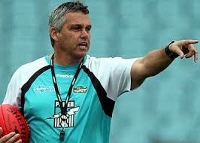Coaching The Coaches – Mark Williams
- Wednesday, April 12 2017 @ 10:03 pm ACST
- Contributed by: Wesley Hull
- Views: 2,681


One of the most endearing images from the 2017 National AFL Male Kickstart & All Nations Championships was former Port Adelaide Power premiership coach, Mark Williams, standing beside a young African player on the All Nations oval after a match stepping him through the basics of how to kick. As this story is being typed he is doing it again with a young Queensland indigenous player.
In a decorated career spanning playing days in the SANFL (West Adelaide & Port Adelaide) and VFL (Collingwood & Brisbane Bears) and a variety coaching, assistant coaching and his most recent specialist coaching role in the AFL with Richmond (Head Development Coach), Mark knows the coaching game backwards, forwards and sideways. The son of the “father of Port Adelaide” – Fos Williams – Mark holds one of the finest pedigrees in football. It is that pedigree he is bringing to the championships, coaching the coaches and watching over the players.
Mark is also very quick to point out that that he was also a premiership player with the Windsor Zillmere team in Queensland and a Queensland state player – adding to his impressive list of achievements.
But his key role at the championships has been to help educate the coaches of the state teams and monitor their progress as coaches at the event. He is the key selector of coaches from this event to go on and coach the Flying Boomerangs and World teams.
In a series of education sessions held each day of the event, Mark has imparted his knowledge on a range of footballing subjects – general and technical.
On the subject of how coaches can communicate better with their players, Mark cited (and elicited from the coaches) the use of more specific instructions being given, delegating more to assistant coaches and support staff, using specific examples to reinforce messages and referring directly to statistics to drive home messages (examples being tackles, turnovers, contested marks and many more).
Moving into other facets of how a coach can be more effective, Mark spoke of motivating players, using an arm around a shoulder to show care and connection with a player, the importance of having a game plan and ensuring that all players understand the requirements and breaking into line groups (midfielders, forwards, defenders) to unite player groups with common messages.
He gave examples of messages such as tall players in the middle, never let the ball get behind for defenders, move ball to corridor and forwards should never be outmarked but he emphasised that these expectations can only be met if they are communicated correctly and accurately by the coach to the players.
Mark then looked at the importance of coaches analysing KPI’s (Key Performance Indicators) to make informed decisions about players, matchups at stoppages, match trends and more. An understanding of the strengths and weaknesses through these indicators can address needs for forwards, midfielders, defenders and highlight effectiveness at stoppages, engagement of support from other players in contests and tactical moves such as guarding of space and the effectiveness of sweepers.
During one session, Mark ran through the basics of how to teach a player to kick – the most fundamental skill in the game. He reiterated to the coaches that technique and mechanics of kicking has to be explicitly taught and not be a matter of chance as a player develops.
During one of the sessions, Mark was joined by Sudanese born Sydney Swans player, Aliir Aliir. As he interviewed Aliir about his journey to footy, his adjustments to the game, which player has helped him the most (key defender Heath Grundy) and the best advice he has received (from Michael O’Loughlin to always take the game on) – Mark also asked the assembled coaches how would they get a person who just walked into the club for a look – such as another Sudanese player without a footy background – to give the game a go. He emphasised that a big part of that answer was a positive sell from the coach to make the potential layer believe they can play.
The one indisputable aspect of the sessions with Mark Williams was that every coach came out just that little bit better, wiser, prepared and motivated. And that was largely Mark’s purpose – to use his vast array of experience and successes to prepare the next generations of coaches both at carnival of this nature and beyond – or simply at the most basic grassroots levels of the game.


 RSS news
RSS news Twitter
Twitter Facebook
Facebook